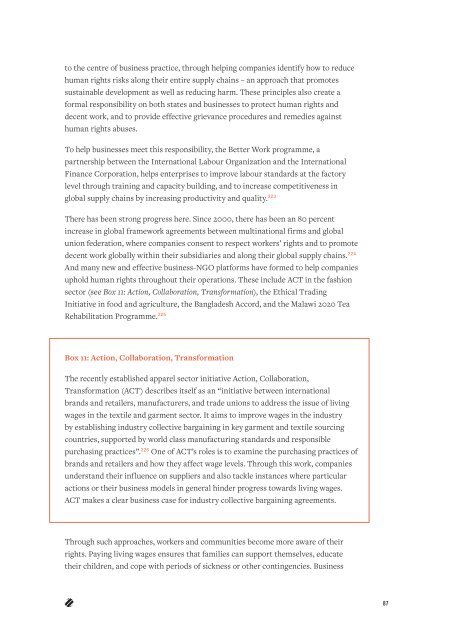BETTER BUSINESS BETTER WORLD
2jxE7K2
2jxE7K2
Create successful ePaper yourself
Turn your PDF publications into a flip-book with our unique Google optimized e-Paper software.
to the centre of business practice, through helping companies identify how to reduce<br />
human rights risks along their entire supply chains – an approach that promotes<br />
sustainable development as well as reducing harm. These principles also create a<br />
formal responsibility on both states and businesses to protect human rights and<br />
decent work, and to provide effective grievance procedures and remedies against<br />
human rights abuses.<br />
To help businesses meet this responsibility, the Better Work programme, a<br />
partnership between the International Labour Organization and the International<br />
Finance Corporation, helps enterprises to improve labour standards at the factory<br />
level through training and capacity building, and to increase competitiveness in<br />
global supply chains by increasing productivity and quality. 223<br />
There has been strong progress here. Since 2000, there has been an 80 percent<br />
increase in global framework agreements between multinational firms and global<br />
union federation, where companies consent to respect workers’ rights and to promote<br />
decent work globally within their subsidiaries and along their global supply chains. 224<br />
And many new and effective business-NGO platforms have formed to help companies<br />
uphold human rights throughout their operations. These include ACT in the fashion<br />
sector (see Box 11: Action, Collaboration, Transformation), the Ethical Trading<br />
Initiative in food and agriculture, the Bangladesh Accord, and the Malawi 2020 Tea<br />
Rehabilitation Programme. 225<br />
Box 11: Action, Collaboration, Transformation<br />
The recently established apparel sector initiative Action, Collaboration,<br />
Transformation (ACT) describes itself as an “initiative between international<br />
brands and retailers, manufacturers, and trade unions to address the issue of living<br />
wages in the textile and garment sector. It aims to improve wages in the industry<br />
by establishing industry collective bargaining in key garment and textile sourcing<br />
countries, supported by world class manufacturing standards and responsible<br />
purchasing practices”. 226 One of ACT’s roles is to examine the purchasing practices of<br />
brands and retailers and how they affect wage levels. Through this work, companies<br />
understand their influence on suppliers and also tackle instances where particular<br />
actions or their business models in general hinder progress towards living wages.<br />
ACT makes a clear business case for industry collective bargaining agreements.<br />
Through such approaches, workers and communities become more aware of their<br />
rights. Paying living wages ensures that families can support themselves, educate<br />
their children, and cope with periods of sickness or other contingencies. Business<br />
87


